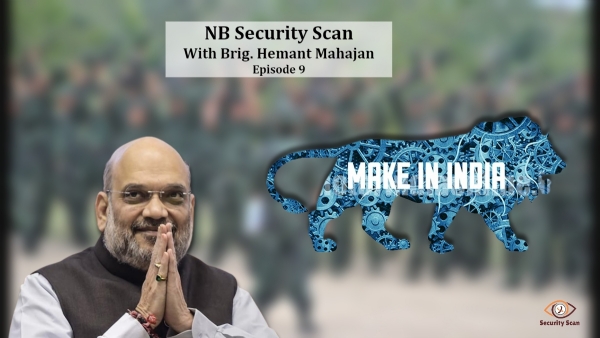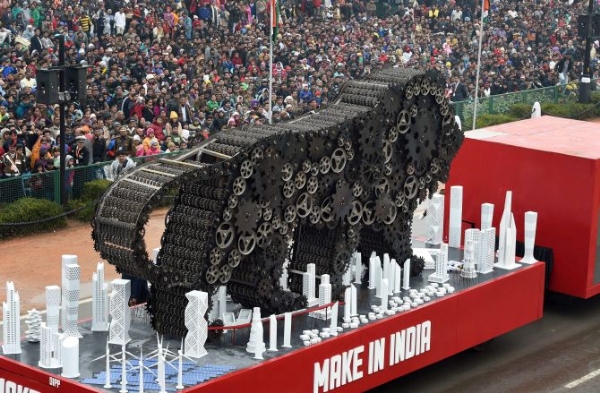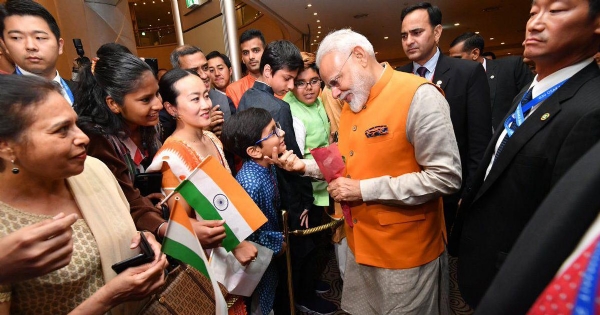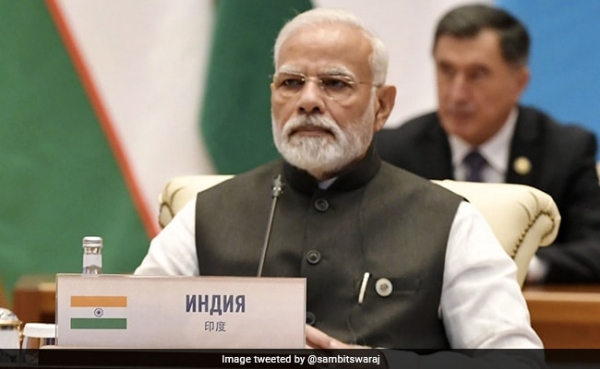SECURITY SCAN 9: North East Insurgency, Make In India Make For World, Food Security & Chinese Shell Coys
The social media platforms including Twitter has to be made clear that to do business in India ,they will have to be responsive to India"s security concerns.
Total Views |
This article is a summary of important events that have taken place in last one week affecting, India's national security. Attempt has also been made to analyze these events and recommend certain specific actions that can be undertaken by us. Internal Security

How Facebook/Social Media Fuels Religious Violence
The social media platform’s haphazard content moderation strategy is failing in India. This is a serious security threat and must be tackled immediately .
The social media platforms including Twitter has to be made clear that to do business in India ,they will have to be responsive to India's security concerns.
Centre and Assam Government signs a tripartite peace pact with eight militant outfits
The Centre and Assam Government on September 15 signed a tripartite peace pact with eight tribal militant outfits of Assam in presence of Union Home Minister Amit Shah and state Chief Minister Himanta Biswa Sarma. The accord was signed 10 years after the peace process started.
The eight rebel groups include Birsa Commando Force (BCF), Adivasi People's Army (APA), All-Adivasi National Liberation Army (AANLA), Adivasi Cobra Military of Assam (ACMA) and Santhali Tiger Force (STF) and the remaining three outfits are splinter groups of the BCF, AANLA and ACMA. The BCF, APA, AANLA, ACMA and STF have been in a ceasefire with the government since 2012. The cadres of the militant outfits have been staying in designated camps since.
Signing of the agreement will usher in a new era of peace and harmony in Assam. Except the hardline faction of the banned ULFA, led by Paresh Baruah, and the Kamatapur Liberation Organisation, all other rebel groups active in the state have entered into peace agreements with the government.
Meanwhile, a high-level review meeting on issues relating to boundary dispute between Assam and Arunachal Pradesh was held to resolve the issue.
Peace in North East has raised a vision of a peaceful and prosperous Northeast. Peaceful Northeast is very essential from India's security point of view as North East shares 98% of boundaries with other countries like China Myanmar and Bangladesh and just 2% in the Siliguri corridor with rest of India.
EXTERNAL SECURITY
Make In India Make For World
The target of defence exports worth Rs 35,000 Crore by 2025 fixed is ambitious, given that the export of military equipment and technology worth Rs 13,000 crore during 2021-22 was a milestone for the Indian defence industry. There is increasing global interest in what India has to offer and the capability developments. The BrahMos missile is being exported to the Philippines, opening doors for sales to various other Asian countries. A deal with Malaysia on the Tejas fighter jet is on the cards. The consistent progress in the indigenization of weaponry is in line with the mission to become self-reliant, reduce dependence on imports and give more weightage to the export of military equipment to friendly countries.

The US, Russia and France account for nearly 39 per cent, 19 per cent and 11 per cent of global sales, respectively. China has a share of 4.6 per cent. India is placed at the 23rd spot among the top 25 exporters of weapons and increasing its footprint must be done.
India’s defence industry, is participating in the global supply chain significantly. More than half of the exports are going to leading manufacturers in the US. The prime challenge is to establish itself as a provider of dependable goods at competitive prices and setting a sight on producing high-value items.
The commissioning of INS Vikrant, the first indigenous aircraft carrier built at a cost of Rs 23,000 crore, on September 2 was a defining moment in India’s journey to emerging as a defence industrial and technological base. The launch of the Indian Navy’s third Nilgiri-class guided-missile frigate, Taragiri, adds to the list of the state-of-the-art homegrown projects meant to strengthen the marine defence system.
As it shoulders the huge responsibility, the defence industry, both private and public, needs all the assistance from all. Exports also contribute to reducing cost of equipment held by the Indian armed forces and gaining maintenance contracts.
Balance Between Domestic Requirement And Export Market For Food Security
In response to the rising global commodity prices and extreme heat waves affecting production, the Centre had earlier this year restricted wheat exports to protect India’s food supplies. Then, as now, food security and national interest scored over international considerations. The decisions to ban the export of broken rice and impose 20 per cent duty on the export of non-basmati rice are attempts to maintain a similar balance between domestic requirement and export market.

India is the world’s biggest rice exporter, accounting for 40 per cent of the global trade. This fiscal, a drop of 10-12 million tons in production has been predicted owing to deficient rainfall in major rice-producing states such as Uttar Pradesh, Bihar, Odisha and West Bengal. Domestic availability of broken rice has become a concern as a result of the surging global demand because of reduced feed supplies due to the Ukraine war.
Between April and August, exports of broken rice rose by 4,168 per cent against the comparable period in 2019. China, though not a traditional buyer of Indian produce, has emerged as a dominant player this year, picking up significant volumes of broken rice from India.
Broken rice exports are a little under 20 per cent of India’s total rice shipments. Preventing a surge in local prices by ensuring ample supplies is a logical policy decision.
COUNTERING AF-PAK - PAKISTAN : A FAILED STATE
Pak Economy In Dire Straits
Pakistan Prime Minister Shehbaz Sharif has presented a bleak picture of the country’s dwindling economy, regretting that even friendly countries have started looking at Pakistan as one that was always begging for money. “Today, when we go to any friendly country or make a phone call, they think that we have come [to them to beg for money,” Dawn news quoted the prime minister as saying in an address to a lawyers’ convention on Wednesday.
Even dire state of economy is unlikely to reduce Pakistan sponsoring terrorism in Kashmir Valley.
Pak Wanted Humanitarian Aid After Worst Floods, USA Gives F-16
The Biden administration’s approval of a $450-million F-16 fighter jet fleet sustainment program for Pakistan heralds the resumption of major security assistance by Washington to Islamabad. The US State Department has said that the programme will ‘sustain Islamabad’s capability to meet current and future counterterrorism threats by maintaining its F-16 fleet’.
It was in 2018 that the then US President Donald Trump had suspended about $2 billion in security aid to Islamabad for not taking adequate action against the Afghan Taliban and the Haqqani Network terror groups.
Pakistan has done precious little in the past four years to convince the international community of its commitment to counter terrorism. Islamabad needs to explain how it has been using its existing F-16 fighters, if at all, to break the back of terrorists operating from its territory.
The undeniable ground reality is that Pak-based terror groups such as Jaish-e-Mohammad and Lashkar-e-Taiba are targeting India as well as Afghanistan and posing a threat to peace and stability in the region. Considering Islamabad’s lack of credibility on cross-border terrorism, Washington’s decision to bolster Pakistan Air Force’s F-16 prowess is wrong. America’s double standards are obvious: on the one hand, it sees a key role for India in strengthening the anti-China coalition in the Indo-Pacific region; on the other, it has no qualms about encouraging military muscle-flexing by China’s all-weather ally and India’s arch-enemy Pakistan.
Proactive diplomacy is required to stop this deal.
Using Indian Diaspora- soft power

US President Joe Biden has appointed 130 Indian-Americans to key positions in his administration so far, a senior White House official has said, the best representation from the community that makes up around one per cent of the American population.
Indian-origin Suella Braverman is Home Secretary in UK PM Liz Truss's new Cabinet. Indian-American Congressman Ro Khanna introduces standalone bill in US House for CAATSA waiver to India.
4 Crores Indian diaspora yields great soft power in USA, Europe and many other countries. Full use must be made of this soft power to protect India's national interest in various countries and at various world forums.
COUNTERING CHINESE HYBRID WAR
China restricts social media access of activists
Ahead of Winter Olympics 2022,crackdown on activists shows that China is scared a lot about its own people.
Full use must be made of dissent on social media in Tibet, Shin Xiang, Inner Mongolia, Hong Kong and even Mainland China to project true picture of Chinese communist parties dictatorial attitude towards its own people.
Poor performance Chinese Hardware
There are reports that Chinese hardware and weapons are performing poorly abroad. It is safe to assume that within the PLA too the performance must be similar.
It is good news for us.
Punish the Chinese Shell Coys
The Ministry of Corporate Affairs has launched a crackdown on Indian entities that have been providing ‘dummy directors’ to hundreds of Chinese shell companies in cities such as New Delhi, Gurugram, Bengaluru and Hyderabad. The police has arrested the person responsible for getting these firms incorporated through underhand means.
A shell company is usually inactive or defunct; it neither manufactures/offers products nor hires employees or generates revenue. It does stash money and engage in transactions that are not above board. It’s very risky for any company to do business with a shell entity in view of the latter’s dubious credentials.

The Panama Papers, published in 2016, had unearthed global corruption that was concealed behind the operations of anonymous shell companies. About 40,000 such firms were linked to Chinese citizens enjoying political clout, including a close relative of President Xi Jinping. Documents obtained from the hacked database of Panamanian law firm Mossack Fonseca had revealed that many Chinese conglomerates and individuals were banking on shell companies to park ill-gotten wealth in offshore tax
havens.
The ongoing investigation needs to be thorough as well as time- bound so that the entire gamut of activities of Chinese shell companies and their Indian accomplices can be laid bare to warn unsuspecting investors. This menace is part of Beijing’s ploy to make India bleed financially. Reports of Indian employees being in touch with their China-based counterparts through a Chinese instant messaging app point to the blatant misuse of technology for committing fiscal offences.
Citing a threat to national security, the Indian government has banned hundreds of Chinese apps in recent years; more such steps should be taken to curb Chinese-origin fraud and other malpractices. It’s imperative for Indian agencies to get to the bottom of the matter because such crimes can jeopardize the country’s financial security and stability.
Dubious Chinese Terror Stand At UN
The dubiousness of China’s commitment to the global fight against terrorism has been exposed yet again with its ‘politically motivated’ move to block a proposal by the US and India at the UN to blacklist Pakistan-based Jaish-e-Mohammed (JeM) deputy chief Abdul Rauf Azhar, brother of JeM chief Masood Azhar. Beijing has claimed unconvincingly that it needs more time to assess the application to designate him as a ‘global terrorist’ and subject him to assets freeze, travel ban and arms embargo. In June, China had intervened to push back another India-US proposal to list Pakistan- based terrorist Abdul Rehman Makki under the 1267 Al-Qaida Sanctions Committee of the UN Security Council.
Unlike India, China has rarely been scorched by terror attacks. Most of the sporadic strikes have been carried out by militants from the Uyghur minority community, which is predominantly composed of Muslims. China has for long been persecuting the Uyghurs, who belong to the Xinjiang region. It’s noteworthy that Pakistan recently decided to pay millions of dollars in compensation to the Chinese victims of an attack that took place in Khyber Pakhtunkhwa province last year.
India should condemn China’s attempts to shield Pakistan, a notorious abettor of cross-border terrorism, on global platforms. The onus is on the international community to call out Beijing for its tacit support to Pakistani-origin terror, which poses a constant threat to peace and stability in the whole world.
Indian Strategic Autonomy Viewed Positively By Chinese
India’s assertion of an independent foreign policy has generated much discussion online in China.
The Chinese strategic community and political leadership view Modi as being politically astute in pursuing India’s national interests by balancing relations with major powers. Many in China also believe that Bejing should have pursued a similar balanced approach to the Ukraine conflict. Chinese public opinion seems to be of the view that the Indian government has been more successful than China in convincing its public to support its position.
Chinese social media voices draw attention to India using electronic media, social media, alongside official diplomacy to convey Indian viewpoints, and expose the fallacy in the Western arguments. External affairs minister S Jaishankar’s robust interventions at various international forums defending India’s position has made him a star in China.
Beyond China, why SCO is key

Prime Minister Narendra Modi’s presence in the Samarkand meet shows India is engaging with the world on its own terms.
The formal agenda includes stock-taking of SCO’s two-decade journey and talks on ways to enhance cooperation in future. Of greater significance are the bilateral meetings on the summit’s sidelines. PM would meet some of the attendees including President S Mirziyoyev of Uzbekistan.
India’s participation in SCO makes sense as it’s in sync with its approach of strategic autonomy. Geopolitics today is in flux and India has done well to pursue a path of enlightened self-interest and seize opportunities. To illustrate, India didn’t import crude oil from either Russia or the US in the April-June 2021 quarter. In April-June 2022, in the aftermath of the Ukraine war, crude imports from Russia and the US were $6.2 billion and $2.6 billion respectively, propelling both into India’s top five sources of crude imports. Given this context, a bilateral meeting between Modi and Putin will be crucial.
Conclusion
Gains from SCO will be limited on account of China. Also present at the summit is Pakistan’s new PM Sharif. Given the nature of disputes India has with both China and Pakistan, bilateral meetings on summit sidelines are inadequate to make meaningful progress.
SCO is a reminder of the need to be pragmatic in diplomacy, India’s pursuit of strategic autonomy and investing in areas where there is an overlap of interests between countries is a wise course in a fluid geopolitical situation.
The more groups you are part of, the wider your options. It must be made clear to a common Chinese that the Chinese Communist Party is one of the most hated party and China is one of the most hated countries in the whole world while India is respected all over the globe.
WATCH:
---


